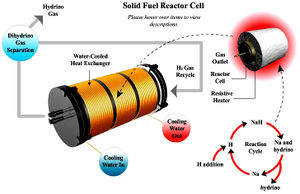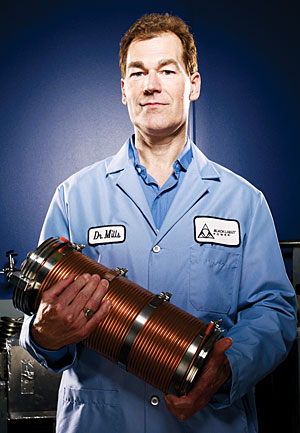Hydrino
Hydrino is the term applied to an invention of US-American physician and electrical engineer Randell Mills (born in 1957). Mills coined this term to identify a hypothetic variant of the hydrogen atom whose electrons are brought onto an even lower orbit. Physicists criticize the theory of hydrinos as pseudoscience[1][2][3][4] and reject it as "blatant nonsense".[5]
A chemical reaction is said to create the alleged hydrino. As a consequence of reducing the orbit, this hydrino atom (which remains hypothetic and has never been sighted as of yet) should emit energy into its environment, while at the same time be more stable than the original hydrogen atom due to the lower orbit. This, however, would be in contradiction to the findings of quantum physics[6], a fact accepted by Mills who nevertheless contends mainstream quantum physics should be replaced by his grand unified theory of classical quantum mechanics(GUT-CQM) which allegedly was compatible with the existence of hydrinos.[7] Mills refers to results of MIT engineer Hermann A. Haus from 1986.
Supporters claim the theory was going to play a role in the development of heating systems and future rocket drives. American NASA, however, did not express an interest.
Commercial activities
A company by the name of "BlackLight Power"[8] is known as a supplier of hydrino technology. BlackLight Power was founded by Mills in 1991 under the name of "HydroCatalysis Inc." and operates in Cranbury, New Jersey.[5] The company is funded by assets from investors and not by sales of products or licences. Time and again, BlackLight Power announced they were just months from a breakthrough of their technology which regularly resulted in the entry of new investors.[9] In 1997, BlackLight Power declared they were only six months from building a 100 kilowatt aggregate. Similar announcements are known of the companies [Felix Würth AG]] and Perendev Group in Germany. Munich-based Perendev Group of Mike Brady is not available by phone any longer; involved persons defected to Switzerland, and Brady was arrested in his home in Wollerau (Switzerland) on March 29, 2010. Prior to this, charges had been filed since advance payments for alleged energy producing magnet generators had been embezzled.[10] In Switzerland, the company Raum-Quanten-Motoren AG (RQM) owned by one Hans Lehner likewise tried to convince investors with a similar mode of operation. In Ireland, Steorn company has been trying to find investors for their "Orbo" technology which they claim will produce energy „in the near future“.
According to Mills and BlackLight Power, hydrinos emitted energy in the form of ultraviolet light (known as black light) and there were 137 energy levels of the hydrogen atom below its ground state. They claim it was possible to produce between one to twohundred times more energy from hydrogen than with chemical combustion. A prototype of a generator was said to produce a heat capacity of 50 kws, and a fraction of this energy was sufficient to obtain hydrogen from water. If the allegations made by BlackLight Power were true, this would allow the construction of a perpetual motion. Such a device, however, violates the laws of thermodynamics.
Hydrex
The hydrino theory is very similar to the assumptions of Jacques Dufour und Jacques Foos from France who speak of a compressed hydrogen atom they call hydrex and which they link to a hypothetical cold fusion. Suggestions regarding how to produce a hydrex atom, however, differ from those refering to hydrinos. A hydrex allegedly forms in the presence of an intense electro-magnetic field.
Patents
- US Patent 6,024,935: Lower-Energy Hydrogen Methods and Structures. Date of Patent: Feb 15, 2000
Literature
- Alok Jha: Fuel's paradise? Power source that turns physics on its head, The Guardian, 4. November 2005
Weblinks
- http://www.heise.de/tp/r4/artikel/28/28971/1.html
- http://en.wikipedia.org/wiki/Blacklight_Power
- http://techskeptic.blogspot.com/2008/07/more-nonsense-in-energy-sector.html
- http://www.chem.info/ShowPR.aspx?PUBCODE=075&ACCT=0000100&ISSUE=0908&ORIGRELTYPE=TJI&RELTYPE=PR&PRODCODE=00000&PRODLETT=EA&CommonCount=0
- http://www.iop.org/EJ/article/1367-2630/7/1/127/njp5_1_127.html
- http://www.iop.org/EJ/abstract/0022-3727/41/10/108001/
Versions of this article in other languages
- Deutsch: Hydrino
References
- ↑ Loser: Hot or Not?, IEEE Spectrum 2009
- ↑ An overview of almost 20 years' research on cold fusion, Contemporary Physics, 2008
- ↑ BlackLight Power bolsters its impossible claims of a new renewable energy source, The New York Times, 2008
- ↑ "A critical analysis of the hydrino model", New Journal of Physics 2005
- ↑ 5.0 5.1 "Academics Question The Science Behind BlackLight Power, Inc.", Crimson Staff (May 17, 2000).
- ↑ BlackLight's physics-defying promise: Cheap power from water, CNN Money, 2008
- ↑ The Grand Unified Theory of Classical Physics by Randell Mills
- ↑ Website BlackLight Power
- ↑ "Researcher Claims Power Tech That Defies Quantum Theory"Dow Jones NewsWires (October 6, 1999)
- ↑ Hokuspokus-Betrüger festgenommen!, tz-online, 2010 (German)

